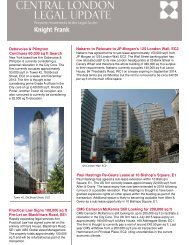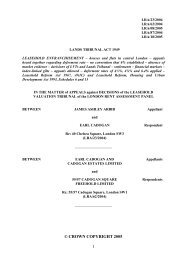57 Shawfield Street - Knight Frank
57 Shawfield Street - Knight Frank
57 Shawfield Street - Knight Frank
You also want an ePaper? Increase the reach of your titles
YUMPU automatically turns print PDFs into web optimized ePapers that Google loves.
(Signed) N J Rose FRICS<br />
Addendum<br />
80. I have received written submissions on costs.<br />
81. The appellant submits that the respondents should pay the appellant’s costs of their own<br />
appeal and the appellant’s appeal pending consolidation and the appellant’s costs following<br />
consolidation. It gives four reasons for this submission. Firstly, the respondents’ appeal,<br />
which was first in time, failed. Secondly, on 27 June 2003, the appellant gave notice of<br />
intention to respond and lodged its own application for permission to appeal out of time. On<br />
the same day, the appellant’s solicitors wrote to the respondents’ solicitors without prejudice<br />
save as to costs, offering to settle both appeals on the basis that the respondents pay the price<br />
determined by the LVT. All the costs incurred thereafter would have been avoided if that offer<br />
had been accepted. The costs incurred before 27 June 2003 will have been negligible in the<br />
context of the costs since incurred. Thirdly, the appellant succeeded on one of two issues upon<br />
which it appealed. Fourthly, the respondents had made a simple appeal with a limited number<br />
of issues much longer and much more expensive than needed. A considerable amount of time<br />
had been spent on the first morning trying to prevent the appellant raising the issue on which it<br />
succeeded. The respondents’ attack on the integrity of the appellant’s witnesses (and its<br />
counsel and solicitor) also involved much time and was unhelpful and unwarranted.<br />
82. The appellant’s appeal only failed because the Lands Tribunal decided that the difference<br />
between its determined figure and that of the LVT was not so great that the Lands Tribunal<br />
could say that the LVT was wrong. Neither party had argued that point. So far as the appellant<br />
was aware, in no other appeal to the Lands Tribunal had it been suggested that a difference of<br />
5.4% or nearly £27,000 was so little as to be ignored. The only other appeal where the issue<br />
had been addressed in similar terms involved a difference of less than 3% and less than £4,000.<br />
83. The respondents submit that they should pay the appellant’s costs of the respondents’<br />
appeal (which was dismissed) and the appellant should pay the respondents’ costs of the<br />
appellant’s appeal since that, too, was dismissed. In any event, it must be right that the<br />
appellant should pay the respondents’ costs of the appeal on the deferment rate issue, having<br />
regard to the special factor that the appellant did not contend for a 5¼% rate at the LVT.<br />
84. It was the clear policy of the statutory regime relating to the determination of issues on<br />
enfranchisement disputes that a tenant was entitled to a hearing before the LVT without any<br />
potential costs liabilities to the landlord. In this case, the appellant did not raise the 5¼%<br />
deferment rate issue before the LVT. In those circumstances, it could not be right that the<br />
tenants were denied a hearing on the argument over the 5¼% deferment rate issue before the<br />
LVT, at which they would not have been exposed to any liability on costs.









